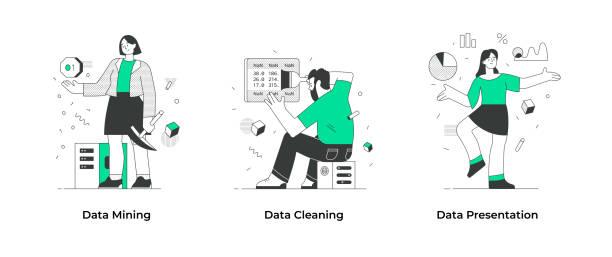Data Science has grown rapidly as firms use data to make decisions. Data scientists use statistical and computational skills to learn from data. Data scientists working remotely are in high demand. This page discusses data scientists, their roles, income possibilities, and where to find remote data scientist jobs.
They analyze complex data sets to gain insights. They identify data patterns and trends using statistical and computational skills to guide business decisions. Data scientists must be proficient in Python, R, and statistical methodologies.
They collect, clean, and analyze enormous datasets. They employ data analysis to make commercial decisions. Data scientists may also create algorithms and models to forecast future events using historical data. They identify company needs and provide data-driven solutions with stakeholders.
Responsibilities of a Data Scientist
Data scientists are professionals who analyze and interpret complex data to extract valuable insights and help organizations make data-driven decisions. Their responsibilities typically involve a combination of technical expertise, statistical analysis, and business acumen. Here are some common responsibilities of a data scientist:
- Data Analysis and Exploration: Data scientists work with large datasets and employ statistical techniques to explore and understand patterns, correlations, and trends within the data. They clean and preprocess the data to ensure its accuracy and reliability.
- Predictive Modeling and Machine Learning: Data scientists develop and deploy predictive models using machine learning algorithms. They apply techniques such as regression analysis, classification, clustering, time series forecasting, and recommendation systems to extract insights and make predictions.
- Statistical Analysis: Data scientists utilize statistical techniques and tools to identify relationships between variables, perform hypothesis testing, and conduct statistical inference. They validate findings using statistical significance tests and ensure the reliability of their analysis.
- Data Visualization: Data scientists use data visualization techniques and tools to present complex data in a clear and intuitive manner. They create charts, graphs, and interactive dashboards to communicate insights effectively to non-technical stakeholders.
- Data Mining and Data Cleaning: Data scientists extract relevant information from raw data sources, including structured and unstructured data. They apply data mining techniques to discover patterns, relationships, and hidden insights. Data cleaning involves handling missing values, outliers, and ensuring data quality.
- Feature Engineering: Data scientists identify and engineer relevant features from the available data to improve model performance and accuracy. They transform and preprocess data, select appropriate variables, and create new features for model training.
- Model Evaluation and Validation: Data scientists assess the performance of predictive models using evaluation metrics such as accuracy, precision, recall, and F1-score. They validate models through techniques like cross-validation and adjust models as necessary to improve their performance.
- Collaboration with Stakeholders: Data scientists collaborate with business stakeholders, domain experts, and IT teams to understand business requirements, formulate research questions, and translate them into data science projects. They work closely with these stakeholders to ensure that their analysis aligns with business objectives.
- Deployment and Integration: Data scientists work with engineering teams to deploy models into production environments. They ensure the scalability and reliability of the deployed models and integrate them into existing systems or applications.
- Continuous Learning and Research: Data scientists stay updated with the latest advancements in data science, machine learning, and related fields. They continuously learn new techniques, tools, and technologies through self-study, attending conferences, participating in online courses, and reading research papers.
- Ethical Considerations: Data scientists adhere to ethical standards and privacy regulations when handling sensitive data. They ensure compliance with data protection and privacy policies, address bias and fairness concerns in their models, and maintain data security.
- Communication and Reporting: Data scientists effectively communicate complex technical concepts and insights to non-technical stakeholders. They create reports, presentations, and data-driven narratives to convey findings and recommendations to decision-makers.
Qualifications and Training to be a Data Scientist
To become a data scientist, certain qualifications and training are typically required. Here are the key qualifications and training aspects for this role:
- Education: A bachelor’s degree in a relevant field such as mathematics, statistics, computer science, data science, or a related discipline is often required. Some positions may prefer or require a master’s or Ph.D. degree in a related field, especially for more advanced or research-oriented roles.
- Statistical and Analytical Skills: Data scientists should have a strong foundation in statistics, probability theory, and mathematical modeling. Proficiency in statistical techniques such as regression analysis, hypothesis testing, and experimental design is essential. Knowledge of machine learning algorithms and techniques is also valuable.
- Programming Skills: Data scientists need to be proficient in programming languages commonly used for data analysis and machine learning, such as Python or R. They should have experience in data manipulation, cleaning, and analysis using libraries and frameworks like NumPy, pandas, scikit-learn, or TensorFlow.
- Data Visualization: Proficiency in data visualization tools and techniques is important for effectively communicating insights to non-technical stakeholders. Data scientists should be familiar with tools like Tableau, Power BI, or matplotlib to create visually appealing and informative visualizations.
- Data Wrangling and SQL: Data scientists often need to work with large datasets from various sources. Skills in data wrangling, data preprocessing, and SQL (Structured Query Language) for querying and manipulating data in relational databases are valuable.
- Machine Learning and AI: Understanding and applying machine learning algorithms, techniques, and frameworks are crucial for data scientists. Knowledge of supervised and unsupervised learning, natural language processing, deep learning, and related concepts is beneficial. Familiarity with popular machine learning libraries like scikit-learn, TensorFlow, or PyTorch is valuable.
- Data Mining and Big Data Technologies: Proficiency in data mining techniques and tools is important for extracting insights from large datasets. Familiarity with big data technologies such as Hadoop, Spark, or distributed computing frameworks can be advantageous for handling and analyzing big data.
- Domain Knowledge: Data scientists often work in specific industries or domains, such as healthcare, finance, marketing, or manufacturing. Familiarity with the domain-specific concepts, terminologies, and challenges can enhance the effectiveness of data analysis and interpretation.
- Problem-Solving Abilities: Data scientists should have strong analytical and problem-solving skills to tackle complex data-related challenges. They need to be able to formulate research questions, identify appropriate methodologies, and develop innovative solutions.
- Communication and Collaboration: Data scientists must be able to effectively communicate their findings and insights to non-technical stakeholders. Strong communication, presentation, and storytelling skills are crucial. Collaboration with cross-functional teams, including business stakeholders and IT professionals, is important for successful project execution.
- Continuous Learning: Data science is a rapidly evolving field, so staying updated with the latest advancements, techniques, and tools is essential. Continuous learning through online courses, workshops, conferences, and research papers helps data scientists stay current and enhance their skills.
- Professional Certifications: Obtaining relevant certifications can enhance your qualifications as a data scientist. Certifications like the Certified Data Scientist (CDS) by the Data Science Council of America (DASCA) or vendor-specific certifications like AWS Certified Machine Learning – Specialty can validate your expertise and knowledge.
Remember, specific qualifications and training requirements may vary depending on the industry, company, and job requirements. It’s beneficial to research job listings and employer expectations to identify any additional qualifications or skills they may be seeking. Additionally, gaining practical experience through internships, personal projects, or working on real-world data problems can significantly enhance your qualifications as a data scientist.
Average Salary of a Data Scientist
The salary of a Data Scientist varies depending on the industry, location, and level of experience. According to Glassdoor, the average salary for a Data Scientist in the United States is around $120,000 per year. However, this can range from $80,000 to $180,000 depending on the organization and location.
Job Outlook for Data Scientist
As remote work continues to gain popularity, the demand for remote Data Scientists is on the rise. Remote work offers several advantages, including flexibility, increased productivity, and reduced commute times. Several companies offer remote job opportunities for Data Scientists. Some of the top platforms to find remote job opportunities for Data Scientists include:
- Elite Digest
- Remote.co
- Indeed
- FlexJobs
- Glassdoor
When looking for remote job opportunities, it is important to review job descriptions thoroughly and requirements, and tailor your application to highlight your relevant skills and experience. By taking advantage of remote work opportunities, you can build a successful career as a Data Scientist while enjoying the flexibility of working remotely.Data Scientists play a critical role in helping businesses make data-driven decisions. With the rise of remote work, remote opportunities for Data Scientists have also emerged. If you are interested in a career as a Data Scientist and are seeking remote job opportunities, platforms like Remote.co, Indeed, and FlexJobs can be great resources to find job listings.




